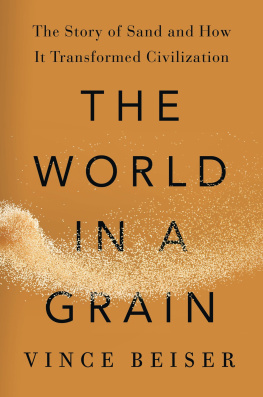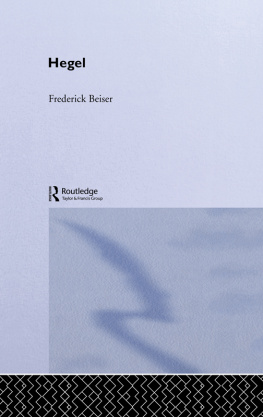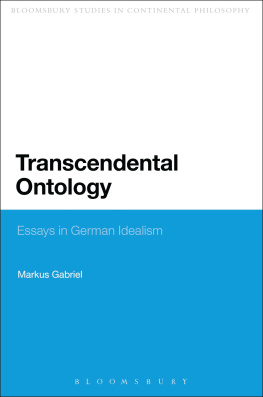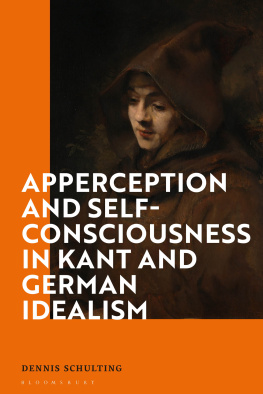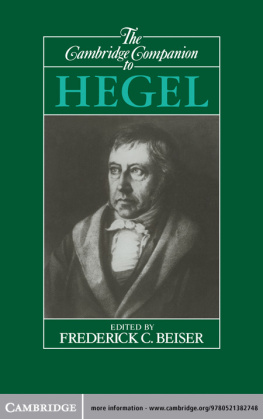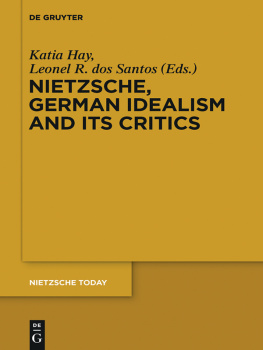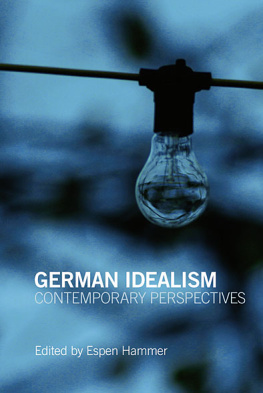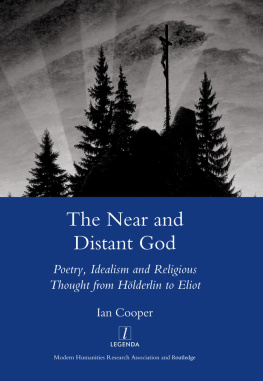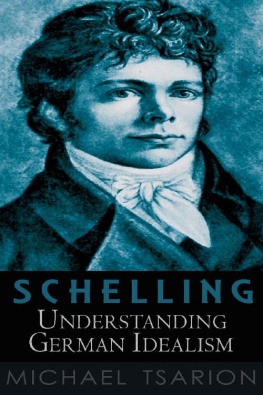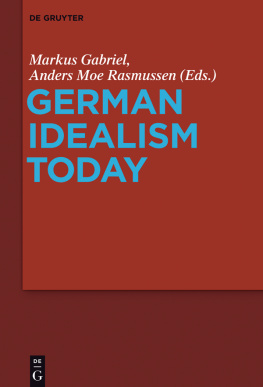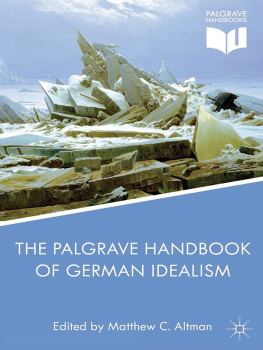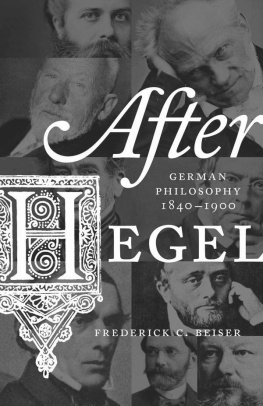BEISER - German Idealism
Here you can read online BEISER - German Idealism full text of the book (entire story) in english for free. Download pdf and epub, get meaning, cover and reviews about this ebook. publisher: Harvard University Press, genre: Religion. Description of the work, (preface) as well as reviews are available. Best literature library LitArk.com created for fans of good reading and offers a wide selection of genres:
Romance novel
Science fiction
Adventure
Detective
Science
History
Home and family
Prose
Art
Politics
Computer
Non-fiction
Religion
Business
Children
Humor
Choose a favorite category and find really read worthwhile books. Enjoy immersion in the world of imagination, feel the emotions of the characters or learn something new for yourself, make an fascinating discovery.

- Book:German Idealism
- Author:
- Publisher:Harvard University Press
- Genre:
- Rating:3 / 5
- Favourites:Add to favourites
- Your mark:
- 60
- 1
- 2
- 3
- 4
- 5
German Idealism: summary, description and annotation
We offer to read an annotation, description, summary or preface (depends on what the author of the book "German Idealism" wrote himself). If you haven't found the necessary information about the book — write in the comments, we will try to find it.
BEISER: author's other books
Who wrote German Idealism? Find out the surname, the name of the author of the book and a list of all author's works by series.
German Idealism — read online for free the complete book (whole text) full work
Below is the text of the book, divided by pages. System saving the place of the last page read, allows you to conveniently read the book "German Idealism" online for free, without having to search again every time where you left off. Put a bookmark, and you can go to the page where you finished reading at any time.
Font size:
Interval:
Bookmark:
GERMAN IDEALISM
Frederick C. Beiser
HARVARD UNIVERSITY PRESS
Cambridge, Massachusetts, London, England
Copyright 2002 by the President and Fellows of Harvard College
All rights reserved
Printed in the United States of America
First Harvard University Press paperback edition, 2008
Library of Congress Cataloging-in-Publication Data
Beiser, Frederick C., 1949
German idealism : the struggle against subjectivism, 17811801 / Frederick C. Beiser.
p. cm.
Includes bibliographical references and index.
ISBN 978-0-674-00769-7 (cloth: alk. paper)
ISBN 978-0-674-02717-6 (pbk.)
1. Idealism, GermanHistory18th century. 2. SubjectivityHistory18th century.
3. Philosophy, German18th century. I. Title.
B2745 .B47 2002
141.094309033dc21 2002017186
For Julia
German idealism is a common phrase in literary, historical, and philosophical circles. Broadly, it designates the philosophical doctrines initiated by Kant and then continued by Fichte, Schelling, and Hegel. But, beyond this very general definition, it is difficult to give the phrase a more precise meaning. That is not very surprising. What idealism means in Kant, Fichte, Schelling, and Hegel has been a matter of discussion and dispute for centuries.
The present study continues that discussion and dispute. Its chief task is to explain the meaning of idealism in Kant, Fichte, Schelling, and the young romantics (Hlderlin, Novalis, and Friedrich Schlegel). My chief excuse for doing so is that, at least in the case of Fichte, Schelling, and the romantics, though less so in the case of Kant and Hegel, the meaning of German idealism has remained comparatively underexplored in the English-speaking world. There have been many studies of Kants transcendental idealism and a few of Hegels absolute idealism; but there has been very little in English about German idealism as a whole. The greatest student of German idealism in the Anglo-American world was Josiah Royce, whose Spirit of Modern Philosophy and Lectures on Modern Idealism have influenced generations of students. Yet I hope to show that, for all its merits, Royces interpretation has been profoundly misleading; in any case, Royce wrote without the benefit of much of the material available today.
There are good reasons for rethinking the meaning of German idealism. Since the 1960s there has been a remarkable resurgence of interest in the subject. Prima facie this is puzzling, since so much contemporary philosophywhether in the pragmatic, existentialist, or analytic traditionhas its roots in the reaction against German idealism. There is indeed no going back to the age when the absolute once ruled the philosophical firmament. Yet, paradoxically, the very reasons for the obsolescence of German idealism have also been the reasons for its revival. These modern traditions understand themselves only when they appreciate what they grew out of and reacted against. If pragmatists, existentialists, and analytic philosophers wish to recover their roots, they must eventually grapple with German idealism itself.
The renewed interest in German idealism has as much to do with its abiding philosophical relevance as its vast historical significance. Recent epistemology still struggles to find some middle path between the extremes of skeptical subjectivism and naive realism, foundationalism and relativism, materialism and dualism, Platonism and historicism. But these were essentially the concerns of the German idealists themselves, whose attempts to find that middle path were subtle and sophisticated. Contemporary philosophers seeking to avoid these dilemmas can still find a rich source of inspiration in German idealism.
After centuries of intensive scholarship, no work on German idealism can claim great originality or novelty. Of course, this study is no exception. My debts to previous scholarship, which I have tried to acknowledge in many footnotes, are wide and deep. It is probably worthwhile, however, to point out a few respects in which this study differs from past work, especially the grand surveys of the subject in the German tradition. First, I have not attempted to do justice to the full scope of German idealism, its contributions to the fields of aesthetics, morals, and metaphysics, as well as to epistemology. This study is much more limited in focus. It concentrates on one specific theme: the meaning of idealism itself, and more specifically the reaction against subjectivism. I have focused upon this specific theme because it has been fateful for the reception of German idealism, which has so often been dismissed as a grandiose form of subjectivism. My central thesis is that, from its very inception, German idealism was a reaction against subjectivism, an attempt to prove the reality of the external world and to break out of the egocentric predicament. Second, I have made the young romanticsHlderlin, Schlegel, Novalisinto crucial figures in the development of German idealism. The romantics have usually been placed either outside the idealist tradition entirely or inside it as mere transitional figures. But neither view is correct: the early romantics were the true founders of absolute idealism. Third, this study of German idealism omits Hegel, and it is indeed a reaction against the Hegelian legacy. Hegels history of the period, which interprets it as a progression culminating in his own system, is tendentious philosophically and anachronistic historically. Fourth, there is no teleology to my history. I do not see German idealism either as a progression toward Hegel or as a decline from Kant. If we impartially and thoroughly examine each thinker in his own terms, it is unlikely that the results will show simple progress or decline. Each thinker is more likely to have his unique strengths and weaknessesa gain here is a loss thereso that the end result is an aporia or invitation to eclecticism. Fifth and finally, I have attempted to integrate Kants Opus postumum into the general history of German idealism; Kants final years mark such an important development in his thought that they cannot be ignored.
My methodology has been essentially historical and hermeneutical. As far as possible, my aim has been to reconstruct an authors work in its individuality according to his original intention and context. Since they can be tendentious and anachronistic in application to historical material, I have bracketed contemporary philosophical concerns and concepts. I have also given primacy to textual exegesis over philosophical criticism, partly because the interpretation of the texts is so controversial, and partly because the most fair and accurate criticism has to come from the most thorough and sympathetic interpretation.
In this work, unlike my previous studies of classical German philosophy, I have not attempted to interpret a text in its cultural and political context. Although I regard cultural and political interpretation as essential, I do not think that the time is ripe for it in the case of German idealism. The problem is that the basic philosophical content of the texts is still too indeterminate and controversial. No one who approaches them can afford to ignore the fraught history of their interpretation. Without, however, an understanding of their content, any cultural or political interpretation is a hazardous business. A scholar who fails to appreciate the precise status of Fichtes absolute ego, for example, cannot appraise its political and cultural significance.
This study does not pretend to be a contribution to what the Germans call Konstellationsarbeit, that is, detailed research into the context and interactions of German philosophers in Jena in the 1790s. While such research is invaluable, and indeed a necessary basis for work like my own, I have not been able to undertake it in any detailed or concerted manner here. Much of my work has rested on the more detailed research of Dieter Henrich, Manfred Frank, Michael Franz, Violetta Waibel, and others. Given the general state of knowledge of German idealism in the English-speaking world, it is impossible to presuppose acquaintance with this context, still less philosophical interest in it.
Next pageFont size:
Interval:
Bookmark:
Similar books «German Idealism»
Look at similar books to German Idealism. We have selected literature similar in name and meaning in the hope of providing readers with more options to find new, interesting, not yet read works.
Discussion, reviews of the book German Idealism and just readers' own opinions. Leave your comments, write what you think about the work, its meaning or the main characters. Specify what exactly you liked and what you didn't like, and why you think so.

